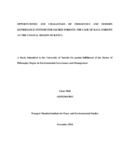| dc.description.abstract | Changing times, attitudes and practices have necessitated re-evaluation of indigenous and modern
systems essential for governance of sacred forests. Although hard evidence is lacking, it is
becoming increasingly clear that the status of many sacred forests is changing. There is need to
define the appropriate governance of the sacred forests through evaluation of both indigenous and
modern governance systems. Exploring opportunities and challenges of indigenous and modern
environmental governance systems of sacred forests with aim of restoring and maintaining the
sacred forests to their expected standards.
The research was undertaken in four Kaya forests namely; Kaya Kinondo, Kaya Fungo
(Giriama), the Duruma Kayas and Kaya Jibana. The sample of the four Kaya forest was due to
the state of the forest conservation (minimal to none interference of the Kaya forests). Primary
data was obtained from focused observation, in-depth key informants and group interviews.
These were specifically environmental actors groups involved in the governance of the Kaya
forests. Secondary data incorporated review of legislation on sacred forests, published journal
and grey literature. Literature was reviewed on environmental regulatory framework, socioeconomic
and environment aspects and indigenous verses global governance knowledge relating
to the sacred forests which lead to derivation of archival data on sacred forest.
From the research findings, which were qualitatively analyzed, the researcher proposes a
governance system that integrates indigenous and modern governance system adopting multiscalar
action form/pointers of environmental governance. These pointers include the principles of
effective governance namely: Integration, Involvement, Collaboration and Accountability. The
hybrid/multi-scalar nature of the proposed governance of sacred forests involves the engagement of the four levels of authority. The four levels of governance namely supranational, national, subnational
and local has a role to play in the environmental governance of the Kayas (policy
development and implementation).The new governance system derived from the study informs
the finding for future direction in sacred forests governance. The study’s resultant hybrid form of
governance system ensures the sacred forests are sustainably governed. The hybrid governance
system balances economic interest and sustainability aspect of the sacred forests | en_US |

